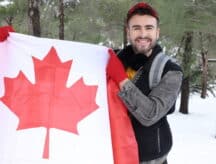How can my parents and grandparents join me in Canada?
To provide your parent(s) or grandparent(s) with status to live with you in Canada long-term, you have two main options: the Parent(s) and Grandparent(s) Program (PGP), and the super visa.
Both programs can allow your relatives to live with you in Canada, but there are significant differences between the two:
| Super visa | PGP | |
|---|---|---|
| Accessibility | Can apply at any time | Limited intake lottery with an application window and long wait time |
| Typical wait time | 3 months | 6 years* |
| Status granted | Visitor status | Permanent residence |
| Maximum length of stay | 5 years | Unlimited |
*Based on the 2020 intake - invitations were issued in 2024, and IRCC's current processing time is 24 months.
The super visa allows your parent(s) or grandparent(s) to visit you for up to five years at a time. The visa allows for multiple entries over a 10-year period (as of June 2023).
The PGP allows you to sponsor your parent(s) or grandparent(s) to become permanent residents of Canada.
Get a Free Super Visa Telephone Consultation with the Cohen Immigration Law Firm
Do your relatives need a super visa or PR?
Generally, you would only consider the super visa or the PGP for allowing your parents or grandparents to live in Canada on a long-term basis.
If they only intend to visit for six months or less, they can come to Canada on visitor status.
Eligibility
Super visa eligibility
- Your parents or grandparents as eligible to apply for a super visa if they have a host who
- is their child or grandchild;
- is a Canadian citizen, permanent resident of Canada, or registered Indian,
- is at least 18 years old and lives in Canada;
- meets or exceeds the minimum necessary income; and
- promises them financial support for the duration of their visit.
Your parents or grandparents must purchase health insurance for the duration of their stay in Canada.
Income requirements for the super visa
| Size of family unit | Minimum necessary gross income |
|---|---|
| 1 person | $29,380 |
| 2 people | $36,576 |
| 3 people | $44,966 |
| 4 people | $54,594 |
| 5 people | $61,920 |
| 6 people | $69,834 |
| 7 people | $77,750 |
| More than 7 persons, for each additional person, add | $7,916 |
Health insurance requirements
- The super visa requires your parents or grandparents to purchase a health insurance policy from eithera Canadian insurance company; or
- an insurance company outside Canada that is approved by the minister of Immigration, Refugees and Citizenship.
- The health insurance policy should
be valid for a minimum of 1 year from the date of entry;
- be paid in full or in instalments with a deposit (quotes aren’t accepted);
- cover health care, hospitalization and repatriation; and
- provide a minimum of $100,000 of emergency coverage.
PGP eligibility
IRCC defines you as eligible to apply to sponsor your parents or grandparents through PGP if the following applies:
- you’re invited to apply;
- you’re at least 18 years old;
- you live in Canada;
- you’re a Canadian citizen, a permanent resident of Canada, or a person registered in Canada as an Indian under the Canadian Indian Act;
- you meet the minimum income requirements, based on the size of your family; and
- you commit to supporting the people you’re sponsoring by signing a sponsorship agreement called an undertaking.
Income requirements for PGP
To sponsor their parents or grandparents under the PGP for the 2024 intake, a host must meet the following minimum income requirements over the past three years:
| Family size | 2021 | 2022 | 2023 |
|---|---|---|---|
| 2 people | $32,898 | $43,082 | $44,530 |
| 3 people | $40,444 | $52,965 | $54,743 |
| 4 people | $49,106 | $64,306 | $66,466 |
| 5 people | $55,694 | $72,935 | $75,384 |
| 6 people | $62,814 | $82,259 | $85,020 |
| 7 people | $69,934 | $91,582 | $94,658 |
| If more than 7 people, for each additional person, add: | $7,120 | $9,324 | $9,636 |
Application process for super visa
In applying for the super visa, your parents or grandparents must
- be outside Canada;
- have their visa printed by a visa office; and
- take a medical exam.
Your parents or grandparents cannot be inadmissible.
Your parents or grandparents will also have to satisfy Canadian officials that they will voluntarily leave Canada at the end of their stay.
Application process
Invitation only
To be considered for the PGP, you must fill out an interest to sponsor form. IRCC will then decide whether to invite you to apply.
You won’t need an invitation from IRCC for the super visa, but you will need to write a letter inviting your parent(s) or grandparent(s) to Canada.
According to IRCC, a super visa letter of invitation must include the following:
- a promise of financial support for the duration of your visit;
- the list (including name and date of birth) of people included in the family size calculation; and
- the number of people included in the family size calculation
Application for Quebec residents
If IRCC approves your sponsorship application, they’ll ask you to submit an undertaking application to the Quebec ministry in charge of immigration. You must also meet Quebec’s immigration sponsorship requirements.
Don’t submit your undertaking application to Quebec until IRCC tells you to do so. If you don’t wait for their confirmation, Quebec won’t process your application.
Status granted
Visitor status
The super visa grants visitor status only: it does not authorize visa holders to work or to study in Canada.
Visitors may still be considered residents of Canada for tax purposes, in which case they must file Canadian income tax returns each year.
To determine whether they are residents of Canada for tax purposes, super visa holders can consult Income Tax Folio: S5-F1-C1: Determining an Individual’s Residence Status.
They can also call the CRA at 1-800-959-8281 (from anywhere in Canada and the United States) or 613-940-8495 (from outside Canada and the United States)
Permanent resident status
A successful PGP application grants permanent residence status.
Permanent residents enjoy many—although not all—of the same privileges as Canadian citizens, including
- The ability to work in Canada;
- The ability to study in Canada;
- The ability to live in Canada permanently;
- The ability to qualify for provincial health insurance programs; and
- Eligibility for Canadian social programs.
- While sponsored parents and grandparents are eligible for Canadian social programs, their sponsor must foot the bill for any social assistance they receive for the duration of the undertaking (20 years outside Quebec; 10 years in Quebec;).
Wait times
The cutoff to apply for the 2024 intake of the PGP was August 2, 2024. These applicants were randomly selected from people who submitted their interest to apply back in 2020.
For the lottery winners who have submitted their PGP applications, IRCC reports a processing time of 24 months.
In addition to historically long wait times, submitting an interest to sponsor form to the PGP provides no guarantee of your family member being issued an invitation to apply.
There is no yearly cutoff date to apply for the super visa. Once you have applied, it normally takes about three months or less for the application to be processed.
Calculating family size
Calculating family size for the PGP
To calculate a sponsor’s family size for PGP you’ll be responsible for, include the following:
- The people in the sponsor’s family. This includes
- The sponsor
- The sponsor’s spouse (even if separated, in most cases) or common-law partner.
- If the sponsor’s spouse or common-law partner is co-signing the application, include them for all 3 years.
- If they aren’t co-signing, only include them for the years they meet the definition of a spouse or common-law partner.
- The sponsor’s dependent children, the dependent children of their spouse or common-law partner and any dependent children of the dependent children.
- Only include children for the years they meet the definition of a dependent child.
- Any other person the sponsor and their co-signer (if applicable) sponsored or co-signed, for whom an undertaking is still in effect.
- Include the family members (for example, spouse, common-law partner, or dependent children) of the person being sponsored or co-signed for, whether or not they were included in the undertaking.
- The people being sponsored and their family. This includes
- The person being sponsored (principal applicant).
- The principal applicant’s spouse or common-law partner.
- Include their separated spouse, unless either the principal applicant or their spouse is in a common-law relationship with another person.
- The principal applicant’s dependent children, the dependent children of their spouse or common-law partner, and any dependent children of the dependent children.
The calculation must include all the principal applicant’s family members, even if they
- aren’t coming to Canada; or
- are permanent residents of Canada or Canadian citizens.
Calculating family size for the super visa
To calculate the minimum necessary income, include the following people in the family size count:
- The host.
- The host’s spouse or common-law partner (even if separated, in most cases).
- The dependent children of the host and of the host’s spouse or common-law partner. Yourself, and any other super visa applicant(s) applying at the same time (such as your spouse or common-law partner);
- Children who meet the definition of a dependent child must be included in the count, regardless of custody and child support arrangements.
- Previously approved super visa applicants.
- These are super visa holders that were in another letter of invitation, signed by the host or the host’s spouse or common-law partner, that is still applicable.
- Previously sponsored individuals.
- These are individuals the host or co-signer has previously sponsored (or acted as a co-signer for) where the duration of the undertaking is still in effect.
What is a dependent child?
IRCC defines a dependent child as someone who
- is under 22 years old; and
- does not have a spouse or common law partner.
Children ages 22 or older can count as “over-age” dependents if they
- have depended on their parents for financial support since before they reached the age limit; and
- can’t financially support themselves due to a mental or physical condition.
Fees
Below is a table of fees for applying to either program.
| Super visa | PGP |
|---|---|
| -visitor via fee ($100) (paid when applying) | -sponsorship fee ($85) (paid when applying) -principal applicant processing fee ($545) (paid when applying) -right of permanent residence fee ($575) (paid when application is approved) |
Sponsor your parents and grandparents for Canadian immigration
- Do you need Canadian immigration assistance? Contact the Contact Cohen Immigration Law firm by completing our form
- Send us your feedback or your non-legal assistance questions by emailing us at media@canadavisa.com







